Select Language
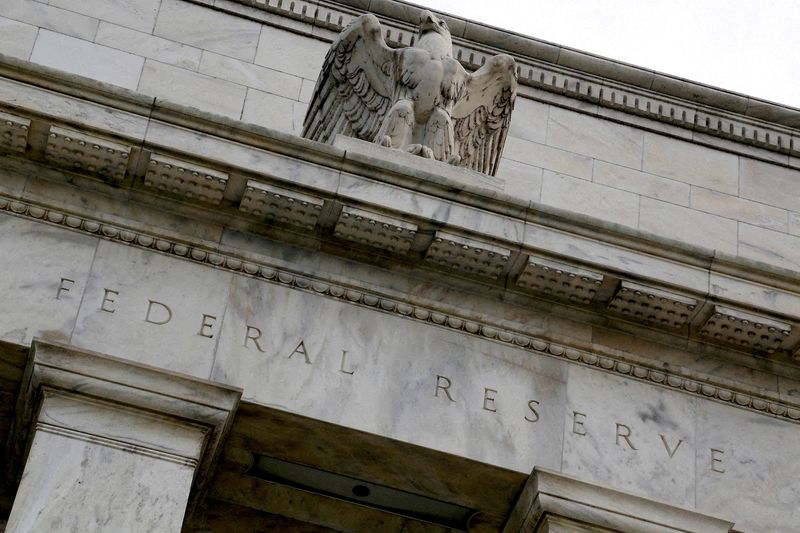
By Indradip Ghosh and Prerana Bhat
BENGALURU (Reuters) - The U.S. Federal Reserve will cut the federal funds rate in June, according to a slim majority of economists polled by Reuters, who also said the greater risk was the first rate cut would come later than forecast rather than earlier.
Reuters surveys since September have consistently predicted the first rate cut would come around the middle of this year. Markets, however, have gone from March to May, and now are priced for June as the most likely time for the first rate reduction.
Although stock markets have surged to record highs, the U.S. 10-year Treasury yield has jumped nearly 50 basis points to 4.28% this month alone, thanks to a series of releases showing strong growth, a tight labor market, and still-sticky inflation.
A strong majority of 86 of 104 economists in a Feb. 14-20 Reuters poll said the Fed would first cut the fed funds rate - currently 5.25%-5.50% - next quarter, similar to last month's survey.
But a slim majority, 53 of 104, now expect June as the most likely meeting, with another 33 calling for May. The rest put the first reduction sometime in the second half of 2024. No one predicted a March cut, compared to 16 in previous poll.
Over the past month, several Fed officials, including Chair Jerome Powell, said the central bank needed greater confidence in the disinflation trend before cutting rates. Inflation on the Fed's preferred measure is still above the 2% target.
Many analysts are coming around to the view the Fed is determined not to repeat its error in 2021 when it and most other central banks judged high inflation to be "transitory."
Kevin Cummins (NYSE:CMI), chief U.S. economist at NatWest Markets, recently shifted his forecast for the first Fed cut to June from May as well as reducing the magnitude of cuts likely this year in part "as growth has held up, for now, more than we expected."
Cummins added: "the 'transitory' blunder has made officials determined not to be caught on the wrong side of the inflation story for the second time in the same cycle."
Personal consumption expenditure (PCE) inflation, the Fed's preferred gauge, is forecast to average around 2% in the second half of 2024, according to the poll, right after the Fed starts cutting.
But other inflation measures - the consumer price index (CPI), core CPI, and core PCE - were still seen above target at least until 2026, suggesting the Fed won't be moving quickly on rates once it gets started.
The world's largest economy, which grew at a better than expected annualized pace of 3.3% last quarter, was predicted to expand an average 2.1% this year, above what Fed officials regard as the non-inflationary growth rate of around 1.8%.
Around 85% of economists, 40 of 47, said the greater risk to their forecast was the first rate cut comes later than they expect rather than earlier, a change from a near-split last month.
Over 60% of economists, 64 of 104, predicted 100 basis points of cuts or less this year, including 43 who forecast rates above 4.25-4.50% at end-2024. That was broadly in line with fed funds futures and the Fed's dot plot projection of 75 basis points of easing.
Asked about their estimate of the neutral rate - the rate which neither stimulates nor restricts - the median of 25 forecasts showed 2.75%-3.00%. That was higher than previous estimates of around 2.5%.
"For now, risks to our growth forecasts are slightly to the upside. If this leads to stickier inflation...The Fed might end up staying on hold for longer than expected," said Michael Gapen, chief U.S. economist at Bank of America.
(For other stories from the Reuters global economic poll:)
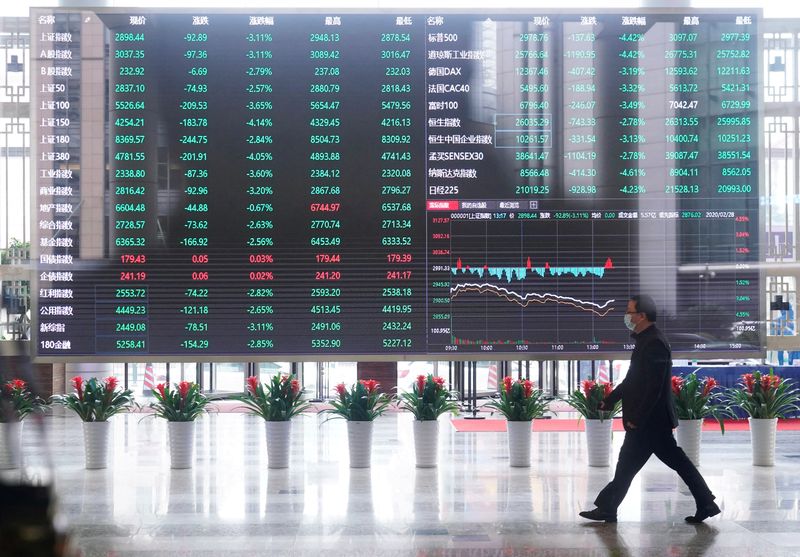
By Suzanne McGee and Megan Davies
(Reuters) - Three straight years of losses from Chinese markets and anti-Beijing rhetoric from Washington have not deterred some U.S. asset managers from introducing products they hope will thrive if Chinese stocks rebound.
China's markets have been hit by a long-lasting property crisis, slowing growth and geopolitical tension. The Institute of International Finance estimates $80 billion of outflows from Chinese portfolios last year, and the bellwether blue-chip CSI 300 Index has fallen 43% from its record high of three years ago. China's markets, which reopen on Feb. 19 after the Lunar New Year holidays, are down nearly 2% year-to-date, bouncing off lows on support measures from Beijing.
Despite the extended pain, U.S. fund managers with China-focused products have been betting that investors will want to return to the market, arguing that valuations make the country hard to ignore.
China's CSI 300 index currently trades at 12 times trailing 12-month earnings, while the S&P 500 index's valuation is at 24 times 12-month earnings, according to Morningstar Direct.
"This is potentially a once-in-a-lifetime opportunity to buy China equities at valuation levels not seen for a long time," Jonathan Krane, CEO of China-focused ETF provider KraneShares, said in an email.
KraneShares has launched four new China-focused exchange-traded funds since the beginning of 2021. Its roster also includes one of the largest China-focused ETFs, the KraneShares CSI China Internet ETF. Launched in 2013, it has about $5 billion in assets.
China's sheer size and economic growth rate - even if lower than in past years - means investors need to have it in their allocations, fund managers argue.
"Do we fundamentally think that the second-largest economy in the world plays a role in investor portfolios? Yup, no question," said Bryon Lake, global head of ETF Solutions at JP Morgan Asset Management. The firm launched the JPMorgan Active China ETF in March 2023, which now has about $9.2 million in assets.
In total there were four U.S.-based, China-focused ETFs launched in 2023, compared with two the prior year and eight in 2021, according to Morningstar data, making a total of 48 US-based, China-focused ETFs at the end of 2023. That takes into account both openings and closures and is a figure little changed in the last several years but up 46% in the last decade.
CHALLENGES IN CHINESE MARKETS
Fund managers, however, have both economic and political challenges with China's markets, from U.S. scrutiny of Chinese investments to an unpredictable environment in China, where there can be sudden resignations or regulatory crackdowns.
"The bear market scenario for China revolves around government policy, trade relationships and other political actions that surprise market participants," said Rich Nuzum, global chief investment strategist at Mercer (NASDAQ:MERC).
The dour sentiment has led some funds to close. Global X Funds plans to shutter ten of its 11 China-focused ETFs, which target a specific sector and together have an average of $7 million in assets. The remaining fund, the Global X China MSCI Consumer Discretionary ETF, is the largest, with assets of $215.4 million.
Global X "probably went a step too far in anticipating that there'd be a China recovery and that it would be broad enough to spill over into sector funds," said Bryan Armour, ETF strategist at Morningstar. "Slicing up the China market that specifically" may have been over-optimistic, he added.
Global X declined to comment on the closures and could not be reached for comment on the assessment of why they closed.
BUILDING BLOCKS
China-focused asset managers hope that being ready with an established fund -- complete with a track record -- will position them to profit most if China rebounds.
Since it typically takes at least six months to roll out a new ETF and the process can be longer for asset managers that have to venture into new territory, having a product with a track record ready to scoop up fast-moving inflows can transform a tiny fund into a large player overnight.
"There are tremendous first-mover advantages in the ETF space" for asset managers willing to battle the headwinds, said Michael Barrer, head of ETF capital markets at Matthews Asia.
Matthews Asia, an investor in China for nearly 30 years, has launched a dozen ETFs targeting Asia, including two devoted to China and several others that include Chinese stocks since July 2022. "That way, when the tide turns, we have product that is readily available."
The firm launched the Matthews China Active ETF last July and the Matthews China Discovery (NASDAQ:WBD) Active ETF in mid-January. The latter targets smaller growth stocks.
In any environment, launching new products -- and keeping existing ETFs alive -- requires careful planning, issuers say.
"Having or adding a China-focused ETF to your family may make perfect sense, because this is a 'building block' that investors will want to use strategically" to get exposure to the world's second-largest national economy, said Matthew Bartolini, head of SPDR Americas research for State Street (NYSE:STT) Global Advisors.

FRANKFURT (Reuters) - Germany is likely in recession now as external demand is weak, consumers remain cautious and domestic investment is held back by high borrowing costs, the Bundesbank said in a regular monthly report on Monday about Europe's biggest economy.
Germany has struggled since Russia's 2022 invasion of Ukraine pushed up energy costs, and its vast, industry-heavy economy is now in its fourth straight quarter of zero or negative growth, weighing on all of the euro zone.
"There is still no recovery for the German economy," the Bundesbank said. "Output could decline again slightly in the first quarter of 2024. With the second consecutive decline in economic output, the German economy would be in a technical recession."
This weak performance has raised questions about the sustainability of the German economic model and critics argue that much of its energy-reliant heavy industry is now being priced out of international markets, warranting an economic transformation.
The government, however, has pushed back on gloomy projections, arguing that it is merely a perfect storm of high energy costs, weak Chinese demand and rapid inflation that temporarily holds back growth but does not fundamentally question economic strategy.
For now the weakness will persist, the Bundesbank argues.
Foreign industrial demand is trending down and the order backlog is dwindling.
Firms are also holding back investment, partly because financing costs have risen sharply since the European Central Bank pushed up interest rates to a record high to combat inflation, the central bank said.
High nominal wage growth is also impacting firms and strikes in key sectors, such as transport, could also weigh on growth in the quarter.
Disruption of shipping in the Red Sea will, however, not have a significant impact because there is plenty of spare capacity in shipping and because freight costs are only a minor part of the overall cost of goods, the Bundesbank said.
While the outlook is weak, the bank said it expects no major deterioration in the labour market, which has insulated the economy so far, and Germany was not facing a broad-based, prolonged recession.
"The weak phase in the German economy that has been ongoing since the beginning of the Russian war of aggression against Ukraine will thus continue," the bank added.
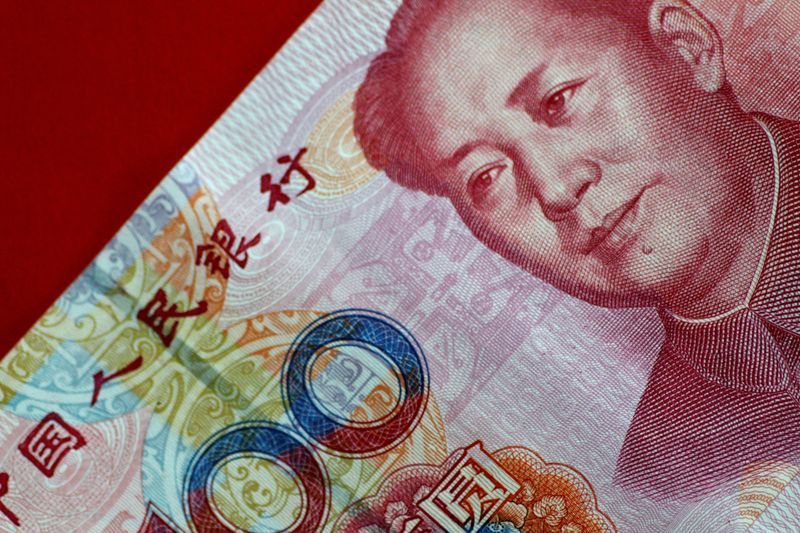
SHANGHAI/SINGAPORE (Reuters) - China is widely expected to trim its benchmark mortgage reference rate at a monthly fixing on Tuesday, as banks' improving net interest margins give authorities some leeway to use monetary stimulus to shore up faltering economy growth.
The loan prime rate (LPR) normally charged to banks' best clients is calculated each month after 20 designated commercial banks submit proposed rates to the People's Bank of China (PBOC).
In a survey of 27 market watchers conducted this week, 25, or 92.6%, of all respondents expected a reduction to the five-year LPR on Tuesday. They projected a cut of five to 15 basis points.
Meanwhile, seven, or 25.9%, of all the participants predicted a cut in the one-year tenor.
Most new and outstanding loans in the world's second-largest economy are based on the one-year LPR, which stands at 3.45%. It was lowered twice by a total of 20 basis points in 2023.
The five-year rate influences the pricing of mortgages and is 4.20% now. It was last trimmed in June 2023 by 10 basis points.
The strong expectation of a reduction to the mortgage reference rate comes after the central bank-backed Financial News reported on Sunday that the benchmark LPR could fall in coming days, with five-year tenor more likely to be reduced.
"Lowering five-year LPR will help stabilise confidence, promote investment and consumption, and also help support the stable and healthy development of the real estate market," the newspaper said on its official WeChat account.
While a slowing economy has hastened the need for lower rates, such moves have been constrained by uncertainties around the timing of U.S. rate cuts and risks of rapid yuan declines and capital outflows.
The LPR is loosely pegged to the medium-term policy rate, and the two sets of rates usually move in tandem. Market watchers said a recent reduction to banks' reserve requirement ratio (RRR) and major lenders' latest cuts to deposit rates should allow banks to cut the LPR.
China's central bank left the MLF rate unchanged as expected on Sunday when rolling over maturing medium-term loans, with uncertainties around the timing of an easing by the Federal Reserve limiting Beijing's room to manoeuvre on monetary policy.
The PBOC's decision to cut RRR and fully roll over maturing MLF loans "underscores the continued commitment to an expansionary monetary policy stance aimed at bolstering economic growth and stability," said Tommy Xie, head of Greater China research at OCBC Bank.
"We see the chance of an imminent LPR cut this month to further support market sentiment."
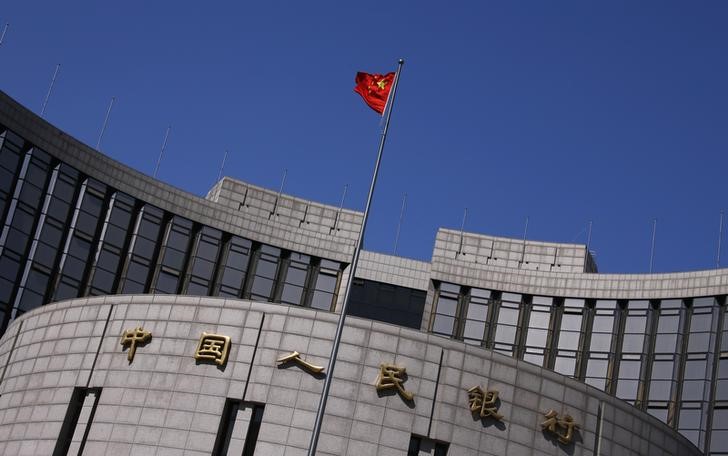
Investing.com-- The People’s Bank of China unexpectedly cut its five-year benchmark loan prime rate on Tuesday, loosening monetary conditions further in a bid to support a slowing economic recovery in the country.
The PBOC cut its five-year LPR, which is used to determine mortgage rates, to 3.95% from 4.10%, while the one-year LPR was left unchanged at 3.45%.
Tuesday’s move was somewhat unexpected, after the central bank kept medium-term lending rates unchanged over the weekend. But steadily worsening economic conditions in China had seen some investors positioning for more monetary easing in the country.
The LPR is determined by the PBOC based on considerations from 18 designated commercial banks, and is used as a benchmark for lending rates in the country.
Tuesday's move marks the PBOC's first rate cut since August 2023, and brings the LPR further into record-low territory. While the bank has remained largely hesitant in trimming interest rates, due to concerns over more weakness in the yuan, consistently worsening economic conditions in China appear to have now forced its hand.
The cut in the 5-year LPR also appears to be directed largely towards the struggling property market, which was battered by a slew of high-profile bankruptcies over the past two years as home sales dried up and house prices plummeted.
The Chinese economy barely grew more than targeted in 2023, and was grappling with a pronounced deflationary trend towards the end of the year. Business activity readings for January also showed little signs of improvement.
While Tuesday's cut is expected to provide more monetary support to the economy, investors have called for more targeted, fiscal stimulus measures from Beijing in recent months, to shore up growth.

By Alexander Cornwell and Pesha Magid
RIYADH (Reuters) -Saudi Arabia's non-oil growth is expected to come in above 5% in the medium term, Finance Minister Mohammed Al Jadaan said on Monday, slightly lower than the 6% figure previously projected, but likely to outperform the wider region this year.
"If you look at the non-oil GDP, it is growing at very healthy numbers: 4% and north of 4%. We are expecting 5%-plus in the medium term," Jadaan told delegates at the Saudi Capital Markets Forum in Riyadh. "That is very strong growth."
The world's top oil exporter is accelerating plans to diversify its economy away from oil under a plan known as Vision 2030. It aims to develop sectors such as tourism and industry, expand the private sector and create jobs.
Non-oil activities vastly outperformed oil sector expansion last year, lifting overall growth which had slowed sharply on the back of cuts to oil production and lower prices.
The International Monetary Fund in January forecast non-oil growth in the oil and gas exporting Gulf Cooperation Council (GCC) states - of which Saudi Arabia is a member - at below 4% this year, projecting 3.9% in 2024 and 4% in 2025.
The IMF also slashed its 2024 GDP growth forecast for the kingdom to 2.7% but said that non-oil growth was still expected to remain "robust".
Jadaan had said in October that non-oil GDP was expected to grow by around 6% in 2023 and beyond, possibly to 2030.
Non-oil GDP grew 4.6% in 2023, while overall GDP contracted 0.9%.
The government expects higher spending in the coming years, which analysts have said will drive domestic growth and support non-oil GDP but will also tilt the kingdom into a fiscal deficit of about 2% this year.
But Jadaan said Saudi Arabia's economic and social reforms - including significantly narrowing fiscal deficits - had allowed it to be better equipped to deal with external shocks such as the COVID-19 pandemic and geopolitical risks.
"We transform socially. We transform economically. We transform in fiscal policy, where we brought all the budget deficits down from 15% to 2% or even less than that. That is how a country becomes more resilient and deals with these shocks," he said in Riyadh.

(Reuters) - Goldman Sachs raised its year-end target for the benchmark S&P 500 to 5,200, reflecting roughly a 4% upside from current levels, citing an improved earnings outlook for the index companies.
The brokerage had previously projected the index to end 2024 at 5,100, before raising the forecast from 4,700 in December, on cooling inflation and expectations of the U.S. central bank easing rates in the year.
Goldman on Friday forecast an 8% profit increase for S&P 500 companies this year, fuelled by an improved U.S. economic outlook and stronger mega-cap profit margins.
"We expect strong world GDP growth and a slightly weaker dollar will support EPS, while lower rates and lower oil prices will be a slight drag," said David Kostin, lead strategist at Goldman Sachs.
Kostin expects the earnings strength of mega-cap stocks, especially those in the Magnificent 7, boosting aggregate S&P 500 profits in 2024. The growth in artificial intelligence and consumer strength is expected to propel revenue growth alongside margin expansion, Kostin added.
He expects the Magnificent 7 stocks to post the strongest earnings growth among S&P 500 sectors.
For the rest of the index, operating margins should also improve, but to a "much smaller" degree, as input costs, such as wage growth, continue to moderate alongside robust sales growth and only modest further price disinflation, Kostin said.

By Orathai Sriring and Kitiphong Thaichareon
BANGKOK (Reuters) -Thailand's economy unexpectedly contracted in the fourth quarter of 2023 from the third, adding to pressure for an interest rate cut as risks grow for the tourism-driven economy from high household debt and China's slowdown.
Gross domestic product (GDP) fell 0.6% in the October to December quarter on a seasonally adjusted basis, the planning agency said on Monday, down from a revised 0.6% rise in the third quarter. The first quarterly contraction in a year compares with a 0.1% rise forecast in a Reuters poll.
From a year earlier, the economy grew 1.7%, slightly faster than a revised 1.4% growth in the third quarter but slower than a forecast 2.5% expansion.
Slowing economic momentum raises the chances of a rate cut at the central bank's next policy review on April 10, after it left this month the key rate steady at 2.50%, the highest in more than a decade, in a split vote. Two dissenters favoured a rate reduction.
State planning agency chief Danucha Pichayanan told a press conference that monetary policy should support the economy and a quick rate cut would help.
Prime Minister Srettha Thavisin and his government have repeatedly urged the central bank to cut interest rates, saying they are hurting consumers and businesses and that the economy is in crisis.
The Bank of Thailand (BOT) has said rate cuts will do little to revive Southeast Asia's second-biggest economy if structural issues persist.
The economy expanded 1.9% in 2023, slower than expected, and less than a revised 2.5% in 2022.
For 2024, the state planning agency expects growth to come in between 2.2% and 3.2%, lower than the 2.7%-3.7% it projected in November.
Exports in 2024 were expected to grow 2.9%, lower than a previous estimate, while headline inflation was seen at 0.9%-1.9%, compared with the central bank's target range of 1% to 3%.
The economy should not contract in the first quarter of 2024 if exports recover, the agency said.
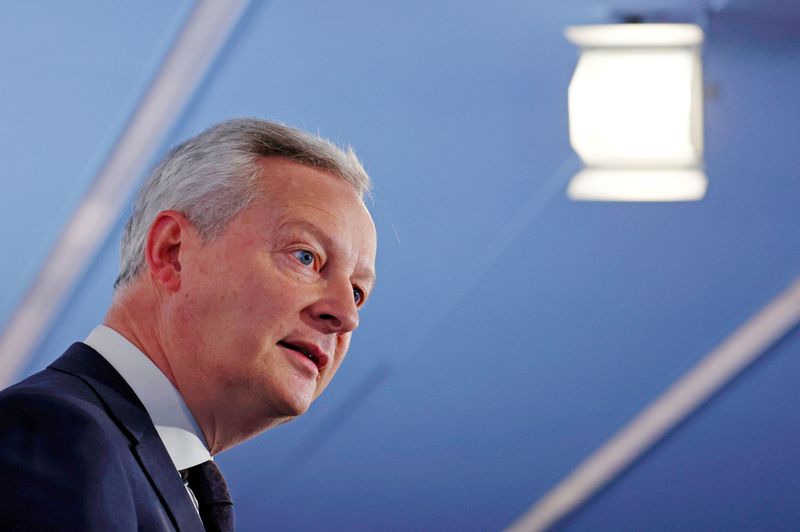
By Elizabeth Pineau and Geert De Clercq
PARIS (Reuters) -French Finance Minister Bruno Le Maire said the government had lowered its forecast for 2024 GDP growth to 1% from 1.4% as war in Ukraine and Gaza and a slowdown at top trading partners Germany and China darkened the outlook.
In an interview with French television TF1, he also said that state spending would be cut by 10 billion euros ($10.8 billion) across all departments and agencies.
"It is a growth forecast that remains positive, but takes into account the new geopolitical context," Le Maire said, citing the war in Ukraine and the Middle East, problems with maritime transport in the Red Sea, and the economic slowdown in China and Germany.
He added that there would be no tax increases and no cuts in social security payments to citizens, but stressed that all government ministries and agencies would contribute to the spending cuts.
"We will immediately cut, in the coming days, ten billion euros in state expenditures," he said.
He said there would be five billion euros in operating expenses cuts for all ministries and another five billion in public policies, notably one billion in public aid for development, and one billion euros on residential building renovation subsidies.
Another billion will be shaved off the budgets of state operators such as export agency Business France and the ANCT agency (Agence Nationale de la Ccohésion des Territoires) for regional government policies.
Le Maire also said the government would make sure that France remained on track to respect its target of reducing the 2024 state deficit to 4.4% of GDP.
"We are keeping the option of implementing a supplementary budget in the summer, depending on economic circumstances and the political situation," he said.
The government aims to gradually cut the fiscal shortfall in coming years until it falls below an EU ceiling of 3% in 2027.
The new government forecast is more in line with a series of recent growth outlook downgrades by the European Commission, the OECD and French statistics agency INSEE.
The European Commission on Feb. 15 cut its 2024 GDP growth forecast for France to 0.9% from the 1.2% seen in November, and it cut its forecast for Germany to 0.3% from 0.8%.
Earlier this month, the OECD cut its 2024 French growth forecast to 0.6% from 0.8% previously.
France's statistics agency INSEE on Feb. 7 forecast quarter-on-quarter growth of just 0.2% in the first and second quarters.
The French economy grew 0.9% in 2023, compared with 2.5% in 2022 and a 6.4% post-Covid spurt in 2021. ($1 = 0.9282 euros)
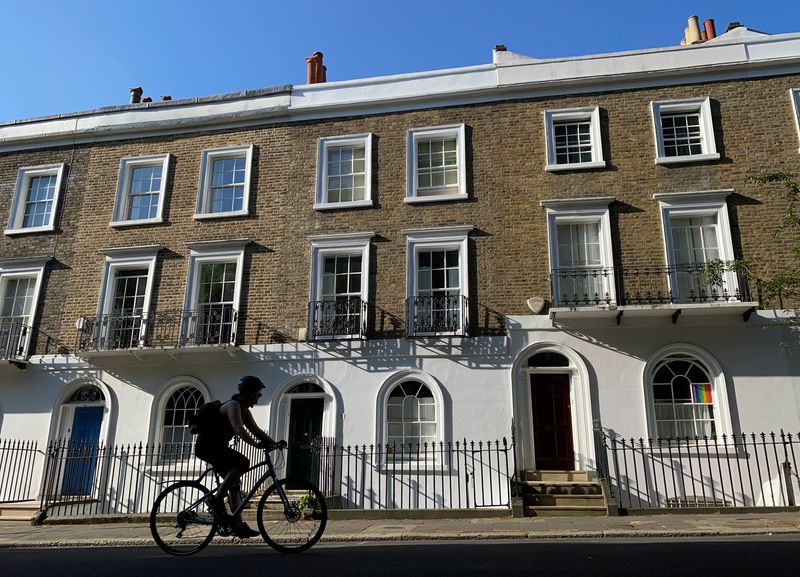
LONDON (Reuters) - The prices of homes being put up for sale in Britain have risen in annual terms for the first time in six months as demand from buyers strengthened, according to an industry survey that added to signs of stabilisation in the housing market.
Property website Rightmove (OTC:RTMVY) said on Monday that asking prices for homes rose 0.1% in February compared a year earlier, the first annual increase since August 2023.
Prices increased by 0.9% from January, broadly in line with the 10-year average of a monthly 1.0% rise in February.
After a slowdown, Britain's property sector has picked up in recent months as mortgage interest rates fell on expectations that the Bank of England will lower borrowing costs this year.
A measure of agreed sales in the first six weeks of 2024 was up 16% from a year earlier and was 3% higher compared with 2019, before the coronavirus pandemic, Rightmove said.
Properties coming onto the market and buyer enquiries increased by 7%.
Tim Bannister, Rightmove's director of property science, said he was only cautiously optimistic with mortgage rates still elevated in historical terms.
BoE officials have said they need to see further evidence of inflation pressures easing before cutting rates, despite the economy falling into a recession late last year.
"While the mortgage market has recovered its stability, there are growing signs that the room for lenders to reduce rates further is narrowing, and that rates will settle at elevated levels for the near future," Rightmove said.
Monday's survey chimed with other signs of an improvement in Britain's housing market.
The Royal Institution of Chartered Surveyors reported this month the biggest jump in new buyer enquiries in nearly two years. Mortgage lenders Nationwide and Halifax both reported a rise in house prices in January.

